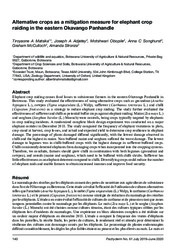Alternative crops as a mitigation measure for elephant crop raiding in the eastern Okavango Panhandle.
Date
2020-08-10Author
Matsika, Tiroyaone A
Adjetay, Joseph A
Obopile, Motshwari
Songhurst, Anna C
Graham, McCulloch
Stronza, Amanda
Metadata
Show full item recordAbstract
Elephant crop raiding causes food losses to subsistence farmers in the eastern Okavango Panhandle in Botswana. This study evaluated the effectiveness of using alternative crops such as groundnut (Arachis hypogaea L.), cowpea (Vigna unguiculata (L.) Walp), safflower (Carthamus tinctorius L.) and chilli (Capsicum frutescens) as a strategy to reduce elephant crop raiding. The study further evaluated the effectiveness of safflower and chilli as potential buffer crops against elephant raiding. Maize (Zea mays L.) and sorghum (Sorghum bicolor (L.) Moench) were controls, being crops typically targeted by elephants in crop raiding incidents. A randomized complete block design experiment was conducted on a major elephant corridor in December 2018. The study compared the frequency of elephant visitations to plots, crop stand at harvest, crop losses, and actual and expected yield to determine crop resilience to elephant damage. The percentage of plants damaged differed significantly, with the lowest damage observed in chilli and the highest in maize. Non-buffered maize and sorghum suffered the worst damage. The lowest damage to legumes was in chilli-buffered crops with the highest damage in safflower-buffered crops.Chilli consistently deterred elephants from damaging crops when incorporated into the cropping systems. Therefore, we conclude, farmers should grow chilli in combination with both legumes (groundnut and cowpea), and cereals (maize and sorghum), which need to be buffered with chilli shrubs. Safflower has little effectiveness as an elephant deterrent compared to chilli. Diversifying crops could reduce the number of elephant raids and enable farmers to obtain increased incomes and improve food security.
URI
https://pachydermjournal.org/index.php/pachyderm/article/download/62/324https://hdl.handle.net/13049/504
Collections
- Reseach articles [146]

